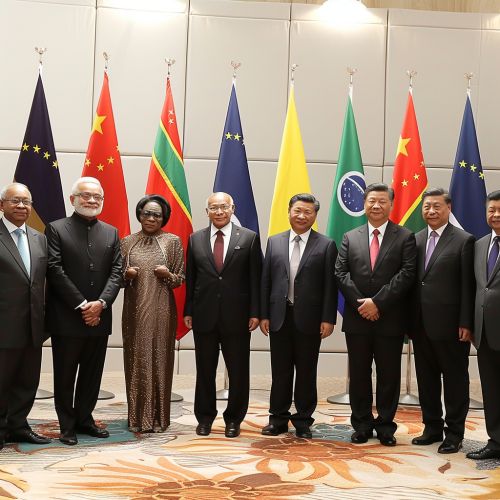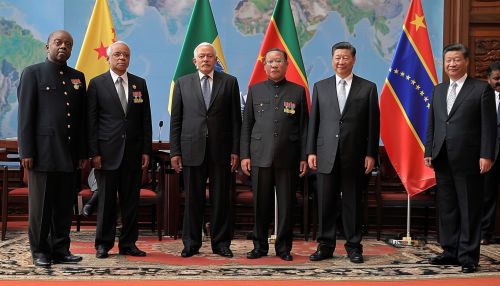BRICS
Introduction
The term "BRICS" refers to an association of five major emerging national economies: Brazil, Russia, India, China, and South Africa. Originally coined as "BRIC" by economist Jim O'Neill in 2001, the term was later expanded to "BRICS" with the inclusion of South Africa in 2010. The BRICS nations are distinguished by their significant influence on regional and global affairs, their large populations, and their substantial economic growth rates. Together, they represent over 3.2 billion people, or about 41% of the world's population, and have a combined nominal GDP of approximately $20 trillion.
Historical Background
The concept of BRICS emerged in the early 2000s as a representation of the shift in global economic power from the developed G7 economies towards the developing world. The initial four members, Brazil, Russia, India, and China, were identified based on their rapidly growing economies and increasing geopolitical influence. The first formal summit of BRIC leaders was held in Yekaterinburg, Russia, in 2009, where they discussed various global issues and ways to enhance cooperation among the member countries. South Africa was invited to join the group in 2010, leading to the formation of BRICS.
Objectives and Goals
BRICS aims to promote peace, security, and development in the member countries and globally. The primary objectives include:
- Enhancing economic cooperation and trade among member countries.
- Reforming international financial institutions to better represent the interests of emerging economies.
- Promoting sustainable development and addressing global challenges such as climate change and poverty.
- Strengthening political and security cooperation to maintain regional and global stability.
Economic Cooperation
BRICS has established several mechanisms to enhance economic cooperation among member countries. One of the most significant initiatives is the New Development Bank (NDB), founded in 2014 with the aim of financing infrastructure and sustainable development projects in BRICS and other emerging economies. The NDB has authorized capital of $100 billion and has approved numerous projects in areas such as renewable energy, transportation, and urban development.
Another key initiative is the Contingent Reserve Arrangement (CRA), which provides financial support to member countries facing balance of payments crises. The CRA has a total committed resource of $100 billion, with China contributing $41 billion, Brazil, India, and Russia each contributing $18 billion, and South Africa contributing $5 billion.


Political and Security Cooperation
BRICS members have also sought to enhance political and security cooperation to address common challenges and promote regional and global stability. This cooperation includes regular meetings of foreign ministers, national security advisors, and other high-level officials to discuss issues such as terrorism, cyber security, and conflict resolution. BRICS has also established the BRICS Think Tanks Council and the BRICS Business Council to facilitate dialogue and collaboration among academics, policymakers, and business leaders.
Social and Cultural Cooperation
In addition to economic and political cooperation, BRICS has also focused on promoting social and cultural exchanges among member countries. This includes initiatives such as the BRICS Network University, which aims to enhance collaboration in higher education and research, and the BRICS Film Festival, which showcases films from member countries to promote cultural understanding and exchange.
Challenges and Criticisms
Despite its achievements, BRICS faces several challenges and criticisms. One of the main challenges is the significant differences in the political systems, economic structures, and development levels of the member countries. These differences can make it difficult to achieve consensus on key issues and implement joint initiatives. Additionally, some critics argue that BRICS has not done enough to address global challenges such as climate change and inequality, and that its impact on global governance remains limited.
Future Prospects
The future of BRICS will depend on its ability to adapt to changing global dynamics and address the challenges it faces. Some potential areas for future cooperation include:
- Expanding the membership of BRICS to include other emerging economies.
- Enhancing cooperation in areas such as technology, innovation, and digital economy.
- Strengthening collaboration on global health issues, particularly in the wake of the COVID-19 pandemic.
- Promoting sustainable development and addressing environmental challenges.
